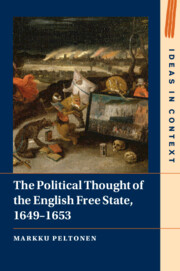Book contents
- The Political Thought of the English Free State, 1649–1653
- Ideas in Context
- The Political Thought of the English Free State, 1649–1653
- Copyright page
- Dedication
- Contents
- Acknowledgements
- Introduction
- Chapter 1 Changing the Form of Government
- Chapter 2 Anti-monarchism
- Chapter 3 The Free State
- Chapter 4 Aristocracy
- Chapter 5 Democracy
- Epilogue
- Bibliography
- Index
Introduction
Published online by Cambridge University Press: 13 October 2022
- The Political Thought of the English Free State, 1649–1653
- Ideas in Context
- The Political Thought of the English Free State, 1649–1653
- Copyright page
- Dedication
- Contents
- Acknowledgements
- Introduction
- Chapter 1 Changing the Form of Government
- Chapter 2 Anti-monarchism
- Chapter 3 The Free State
- Chapter 4 Aristocracy
- Chapter 5 Democracy
- Epilogue
- Bibliography
- Index
Summary
The English free state or republic (1649–53) has always been seen as a failure, which almost no one outside the small coterie of its leaders genuinely wanted or actively supported. Historians have also belittled the importance of the political thought of the republican period. They have explored John Milton’s and Marchamont Nedham’s writings in defence of the republic but have mainly focused on de facto arguments that the free state could demand obedience because it offered peace and security. The Introduction explains how scholars have failed to properly examine the political thought of the period and have underestimated its breadth and depth. It also argues that, once we explore the pamphlet literature published during the free state, we can appreciate the importance of these pamphleteers’ political thinking. The aim is to offer a complete reassessment of the political thought of the English free state and to map the terrain of what it was possible to think.
Keywords
- Type
- Chapter
- Information
- Publisher: Cambridge University PressPrint publication year: 2022

